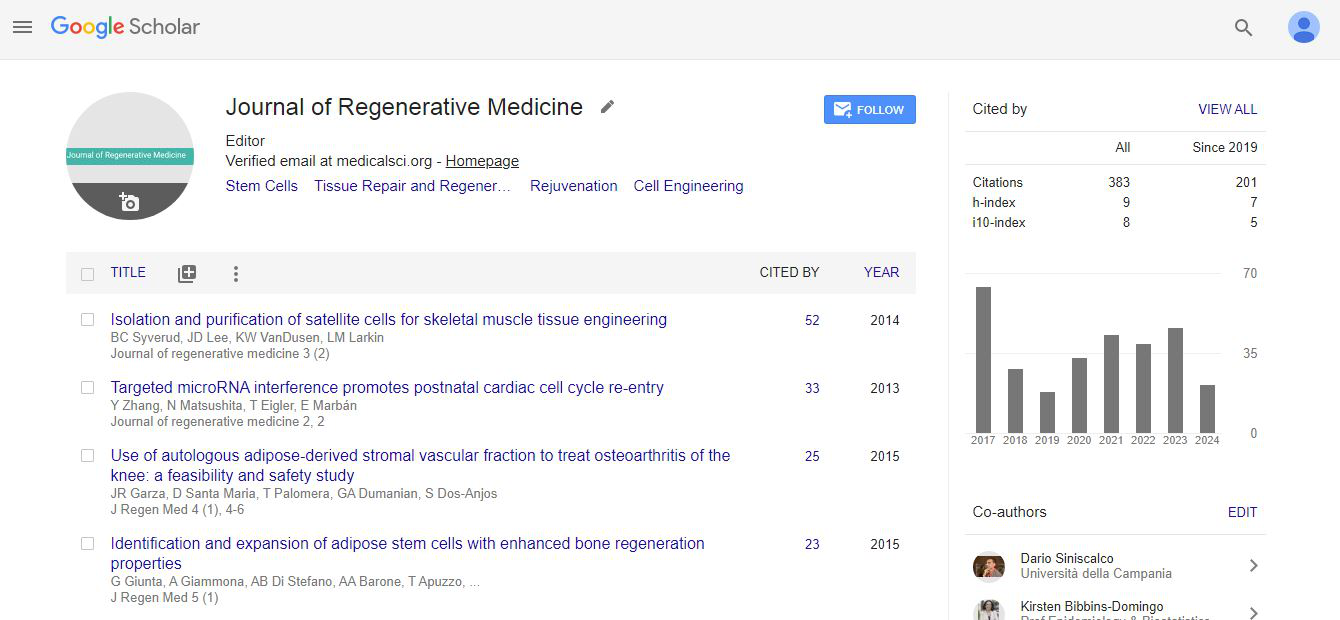In vitro and in vivo functional studies on itga4 overexpressing human bone marrow mesenchymal stem cells
Anna Andrzejewska, Adam Nowakowski, Miroslaw Janowski, Sylwia Koniusz, Piotr Walczak, Tomasz Grygorowicz, Anna Jablonska and Barbara Lukomska
Mossakowski Medical Research Centre, Poland The Johns Hopkins University School of Medicine, USA
: J Regen Med
Abstract
Mesenchymal stem cell (MSCs) therapy is an emerging area of research in regenerative medicine with significant studies being carried out in several clinically important areas. Systemic infusion of MSCs is preferred as a minimally invasive method of transplantation however the success relies upon MSCs migration from the vasculature and their efficient recruitment into appropriate tissues. We hypothesize that the induction of integrin overexpression in MSCs will enhance their adhesion and extravasation through the endothelial wall. The aim of the research was to examine the functionality of modified (mRNA-ITGA4 transfected) human bone marrow MSCs (hBM-MSCs) in vitro (using the microfluidic assay) and in vivo (i.a. transplantation of hBM-MSCs in ouabaininduced brain ischemic rats) studies. The experiments in vitro are based on using special microchannels covered by endothelial cells in which laminar flow of hBM-MSCs was forced and their interaction and adhesion to endothelial cells layer is assessed. After the pressure-driven cell perfusion the naive and ITGA4 overexpressing hBM-MSCs were observed to roll, capture and arrest at the surface of endothelial cell layer. Preliminary studies depicted many more mRNA-ITGA4 transfected hBM-MSCs flowed with the lower speed than naive hBM-MSC. In vivo studies revealed that hBM-MSC injected to the right internal carotid artery migrated into the rat ischemic brain being visible in MRI in the ipsilateral hemisphere. Interestingly, more mRNA-ITGA4 transfected hBMMSCs than non-modified naive cells were found however a constant loss of both types of hBM-MSCs was noticed during long term observation after their transplantation.
Biography
Anna Andrzejewska has completed her studies in Faculty of Biology at University of Warsaw at the age of 24. She obtained her master degree in biotechnology with specialization in molecular biology in 2012 and then started her PhD studies in Mossakowski Medical Research Centre Polish Academy of Sciences at NeuroRepair Department under supervision of Barbara Ã…Âukomska Professor of Immunology and Transplantology. She has already attended 5 conferences including 2 international conferences, where she presented short communication of her results. She has published one paper and currently 2 more publications are in preparation. Email: aandrzejewska@imdik.pan.pl
 Spanish
Spanish  Chinese
Chinese  Russian
Russian  German
German  French
French  Japanese
Japanese  Portuguese
Portuguese  Hindi
Hindi 